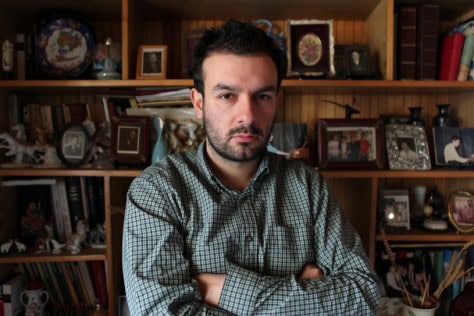A little past midway through Harry Kim’s documentary Dirty Hands: The Art & Crimes of David Choe, a list is ticked off of the number of diagnoses artist David Choe has been given after receiving psychotherapy. And while the list is long, getting ever more serious which each disease added on top of the last, none of it is actually surprising at all.
David Choe has A.D.D., clinical depression, bipolar disease, kleptomania, and gambling, and sexual addictions. After witnessing Choe in all his madness throughout the film, this list merely becomes a statement of the obvious, finally realized in institutionalized terms. But hearing them said about Choe doesn’t make them seem as negative as usual, probably because all of it undoubtedly is what makes Choe the genius talent he is.
This type of contradiction found in Choe – the artful brilliance versus the angsty arrogance – is portrayed wonderfully through Kim’s work by creating a narrative that too is spastic and disorienting. By interspersing one moment in which Choe spits out that his graffiti and stealing are a way of claiming things for himself with another moment where he solemnly shows his sadly hopeful drawings from his time in prison, Kim is pulling audiences in to understand this strange and controversial, but so inherently human, life of David Choe.
At the June 22nd screening of Dirty Hands at the Los Angeles Film Festival, Kim said that he began filming Choe, his childhood best friend, nearly a decade ago simply because he was such a character. For his MFA program at USC’s School of Cinematic Arts, Kim made a short in 2000 about Choe named Whales and Orgies which received good reviews, and after reaching back out to Choe after Choe’s return from prison in 2003, Kim knew he had to keep going on with the project. He came to amass hundreds of hours of footage, including everything from Choe’s trips to the Congo to his fast rise to stardom with art shows and book signings.
“[Harry] went on a filming frenzy [after 2003],” said Elizabeth Ai, co-producer of the film. “The who, what, when, where, why had to be found out. The idea of the feature was launched. Harry Kim was on a mission. Yup, from the year 2000 ‘til now – 2008 – it’s been a wild journey.”
“After going to jail and hearing him tell his story, I knew I had to explain of how he got here,” Kim said.
While Choe’s flawed idiosyncrasies and faults are all on display in Dirty Hands, so too are his most positive traits. Choe makes for a great documentary subject; he is unabashedly honest but reflective, unapologetic but personable. Passionate about his art, and those he loves. At one point, upon remembering what was going through his mind when he awaiting his release date from jail, Choe said he wanted to make sure he’d be back for his brother’s birthday and for Vietnamese New Year. His knack for dry jokes lightens the film throughout and his constant need for excitement makes for fun and unusual adventures.
In portraying both these reflective and mischievous sides of Choe, Dirty Hands refuses to give sympathy to or apologize for his eccentricities. “We embrace this character in all his imperfections in order to patch together a true portrait,” said Ai.
Nevertheless, the film can still make its subject proud, for just like Choe, Dirty Hands wraps skill, fun, desire, and honesty all into one to loudly state the fact that sometimes madness just creates the best art.
 Q&A with Larry Gus
Q&A with Larry Gus We Own the Night: The Edison
We Own the Night: The Edison
No Comments